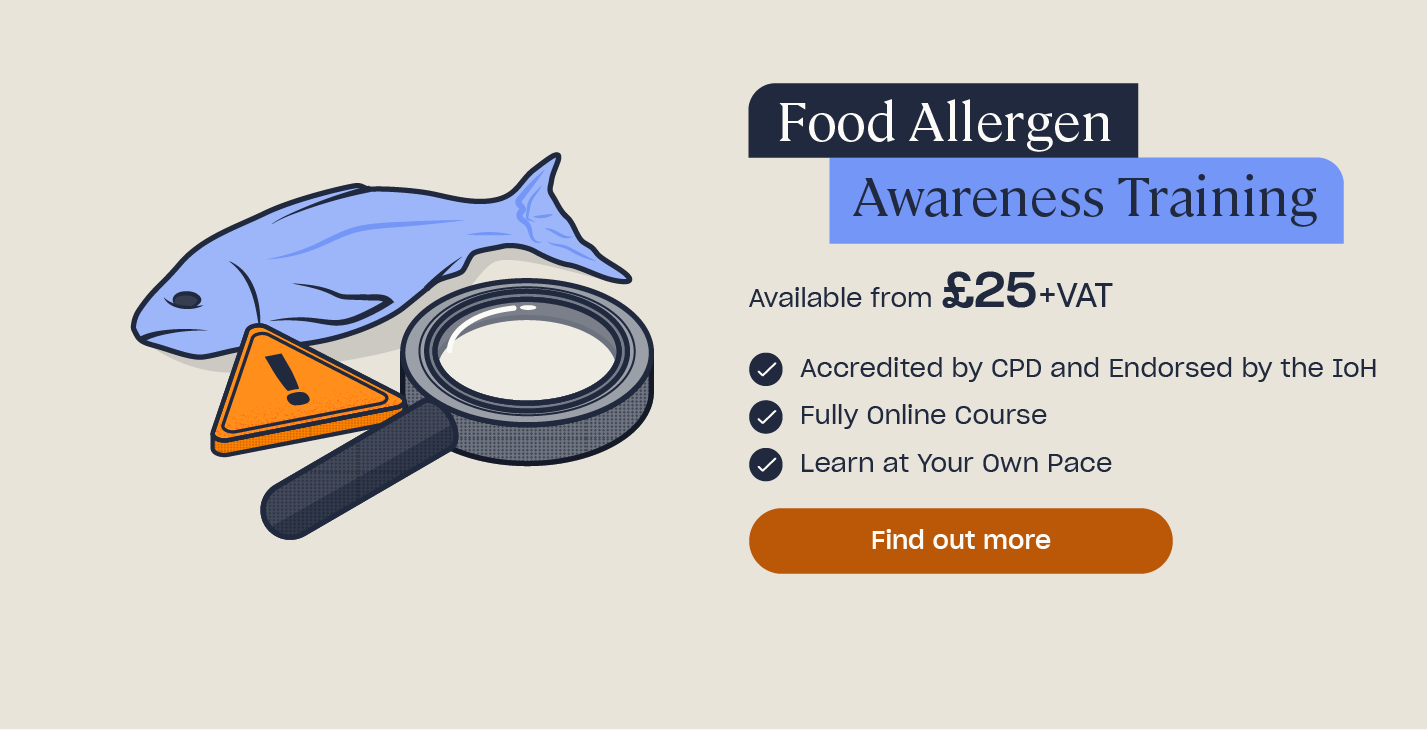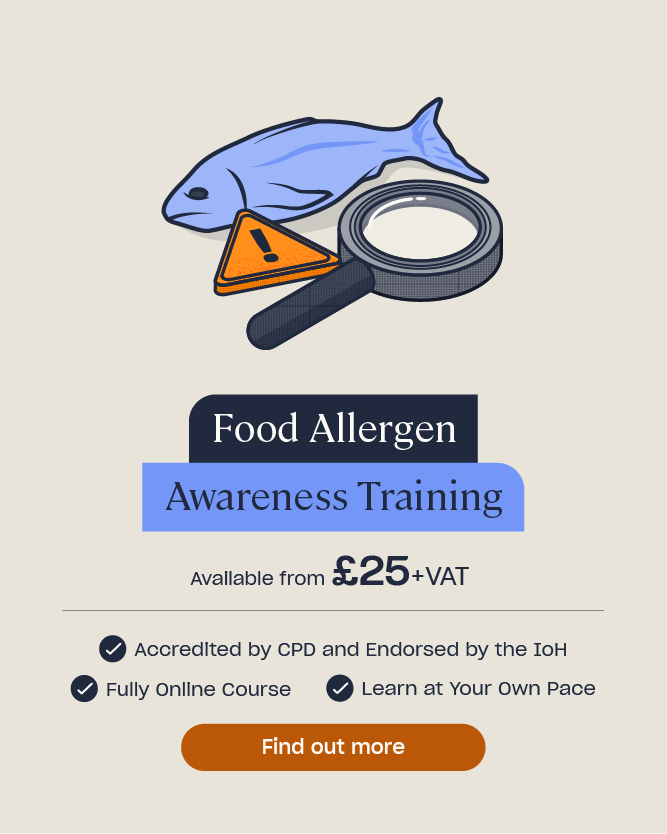What is Owen’s Law?
Food allergies can have tragic consequences when not handled correctly. Without the right precautions and processes in place to keep the public safe, poorly handled allergens can cause allergic reactions which can range from mild to fatal. In recent years there have been numerous incidents of people suffering from severe allergic reactions which have resulted in hospitalisation and even death. These incidents have often been completely avoidable and reflect inconsistent standards regarding allergen management and communication. Adequate allergen information is vital to keeping the public both safe and well informed and can be the difference between someone enjoying a nice meal at your premises or suffering a potentially fatal allergic reaction.
In this article we will outline everything you need to know about Owen’s Law and the changes that your food business can make to support the campaign and help keep people safe.
What is the Owen’s Law Campaign?
In 2017, 18 year old Owen Carey went for lunch with his girlfriend. As someone who suffered from multiple food allergies, Owen explained his allergies to his server and was assured that his order would be safe for him to eat. With no indication from the server or any additional information on the menu, Owen ordered a chicken burger which had been marinated in buttermilk, an ingredient to which Owen was highly allergic. Within an hour of eating the burger, Owen collapsed as a result of a massive anaphylactic reaction and despite the best efforts of paramedics and hospital staff, he tragically passed away.
Following his death, Owen’s family launched the Owen’s Law campaign which advocates for a change in the law surrounding how allergy information is displayed and given in restaurants. Owen’s death was completely avoidable and his family hope to prevent any future needless deaths of people with food allergies with the simple change in labelling and improved staff training.
In 2016, 15 year old Natasha Ednan-Laperouse died after eating a baguette that contained sesame, an undeclared allergen to which she was allergic. In the wake of Natasha’s tragic death her family campaigned for a change to allergen labelling and in 2021 legislation was introduced that mandated that all food pre-packed for direct sale (PPDS) must list all ingredients on the food label. Natasha’s Law is the culmination of years of dedicated campaigning by her family and brought to light the flawed and outdated nature of UK allergen laws. Owen’s Law hopes to build on Natasha’s Law, further enhancing the provision of allergen information so that those suffering from food allergies can make better informed decisions.
What Does Owen’s Law Require of Food Businesses?
Owen’s Law would necessitate the provision of written allergen information on menus in all food businesses including restaurants and cafes.
The campaign is advocating for the following changes:
- Restaurants must legally provide appropriate and accurate information about allergens in writing, at the point of ordering, without the customer having to ask and in a detailed allergy matrix so that customers have full visibility on what they are ordering.
- Restaurants must be obligated to initiate a discussion with customers about allergies on all occasions so that customers do not have to ask.
- Restaurants must provide better training for waiting staff, especially in fast food and high staff turnover environments.

Under Owen’s Law, businesses would have a legal obligation to provide written information about allergens. This could be in the form of symbols, numbers or words that represent the 14 major allergens on a menu, a display board or an app. Moreover, businesses would need to adopt thorough training processes which would include certified training and encourage staff to actively ask customers about allergies.
Owen’s Law has not yet been ratified and is therefore not yet a legal requirement. However, the Food Standards Agency (FSA) has recently updated their guidance regarding best practice when handling allergens. Their guidance echoes the parameters of Owen’s Law and reiterates the FSA’s support of improved allergen information.
How to Prepare for Owen’s Law
Owen’s Law has received notable support from public bodies such as the FSA and whilst it is not currently mandatory to follow the parameters that it sets out, it’s advisable for businesses to do so. Providing thorough and detailed allergen information is vital to keeping the public safe and food businesses should not wait until it is legally mandatory to do so. Not only will adopting these practices help customers with food allergies to make better informed decisions, it will also help them to feel safer when ordering and act as a trust signal that your business is one that cares about safety.
All food businesses should already have robust allergen management policies and practices in place. As such, preparing for Owen’s Law will not necessarily require extensive or expensive additional steps. Practical steps that you can follow to prepare for Owen’s Law include:
- Assessing current allergen management practices – You should already have effective allergen management practices in place, but it’s important that you assess your current processes and see where improvements can be made. In preparing to provide written information to customers you can assess whether you have the necessary information readily available. For example, if you don’t use an allergen matrix for each dish and instead rely on asking the chef what allergens are present each time someone mentions an allergy, now would be a good time to introduce an allergen matrix for relevant dishes and prominently display it or ensure it can be easily accessed by all staff.
- Updating Staff Training – If staff don’t understand the dangers associated with allergen mismanagement they are less likely to adhere to the necessary guidelines and regulations. As such, it’s imperative that you provide adequate allergen training from a reputable training provider. High Speed Training is proud to be the first training provider to receive an official endorsement from the Owen’s Law Campaign. Our Food Allergen Awareness Training provides essential information for food handlers to help them keep customers safe. As part of this training, it’s advisable to talk staff through each dish and the allergens present so that they can confidently convey this information to customers. This will facilitate them actively encouraging conversations around allergens as they have the necessary knowledge to help customers make informed decisions.
- Providing easily accessible information – FSA research highlights the importance of clear written language to communicate allergen needs. As such, you should take the time to decide how you wish to convey this information and ensure that it’s written clearly and is easily accessible. It’s redundant listing the allergens in a dish if it’s in an illegible font squashed in the bottom corner of your menu. Instead, workshop different ways to present the information such as directly on the menu, a separate menu that only lists dishes containing allergens or a stylised allergen matrix in your business’ branding. You can find a range of free resources that you can use to adopt best practice here.

These steps can be further supplemented by prominently displaying allergen posters so that staff have frequent visual reminders of what they need to consider when serving staff. Food allergen risk assessments are also valuable tools to help you track any allergens that you use and to identify and reduce any risk that they may then pose. Allergen management is underpinned by effective communication and it’s vital that you foster an environment of clear communication so that allergen information can be easily and readily shared. This will help to create and maintain a culture of food safety that keeps everyone safe.
FAQs on Owen’s Law
To help you to fully understand Owen’s Law, we have put together some FAQs that you may have regarding the law and how it may impact your business.
When will Owen’s Law be ratified? 
Owen’s Law is not currently a legal requirement and it is difficult to say when/if it will become one. However, the newly updated FSA guidance regarding best practice, which reflects the parameters of Owen’s Law, suggests that it may soon become law. Moreover, the campaign has received extensive public support highlighting a continued need for improved allergen regulations.
Why should businesses adhere to it if it isn’t yet law? 
The food industry is subject to frequent regulation changes and whilst Owen’s Law is not a legal necessity yet, that is not to say that it never will be. By preparing for the law, businesses can ensure that they are adhering to best practice and are fully prepared should the law be ratified. Moreover, taking the extra steps to protect customers with food allergies acts as a trust signifier that you take food safety seriously and are doing everything you can to safely cater for everyone.
What food and drink would Owen’s Law apply to? 
Owen’s Law would apply to non-prepacked food, that is to say food that is sold loose. This includes, but is not limited to:
- Baked goods at a bakery.
- Meals served at a restaurant.
- Loose meat and cheese at a deli counter.
- Drinks made to order in a coffee shop.
Do I have to redesign my entire menu to adhere to Owen’s Law? 
Owen’s Law requires that allergen information be provided in writing but this doesn’t necessarily mean redesigning your entire menu. You may choose to add symbols or numbers to represent the allergens that a dish contains. Alternatively, you may choose to create separate allergen matrices for the dishes that contain the 14 major allergens or a separate allergen menu which can be provided to customers. The information needs to be clear and easy to understand so however you decide to go about adding it, ensure that it is easily accessible.
The tragic loss of Owen Carey was completely avoidable. Had the necessary allergen information been provided to him, he would have been able to make an informed decision as to what he ordered. Adding allergen information to menus and improving staff training are changes that can undeniably save lives. People with food allergies should not be treated as an inconvenience and have every right to enjoy dining out, safe in the knowledge that their needs have been catered for.
Further Resources:
- Allergen Guidance for the Out-of-Home Sector
- Food Allergen Policy: Free Template
- Food Allergen Awareness Training











